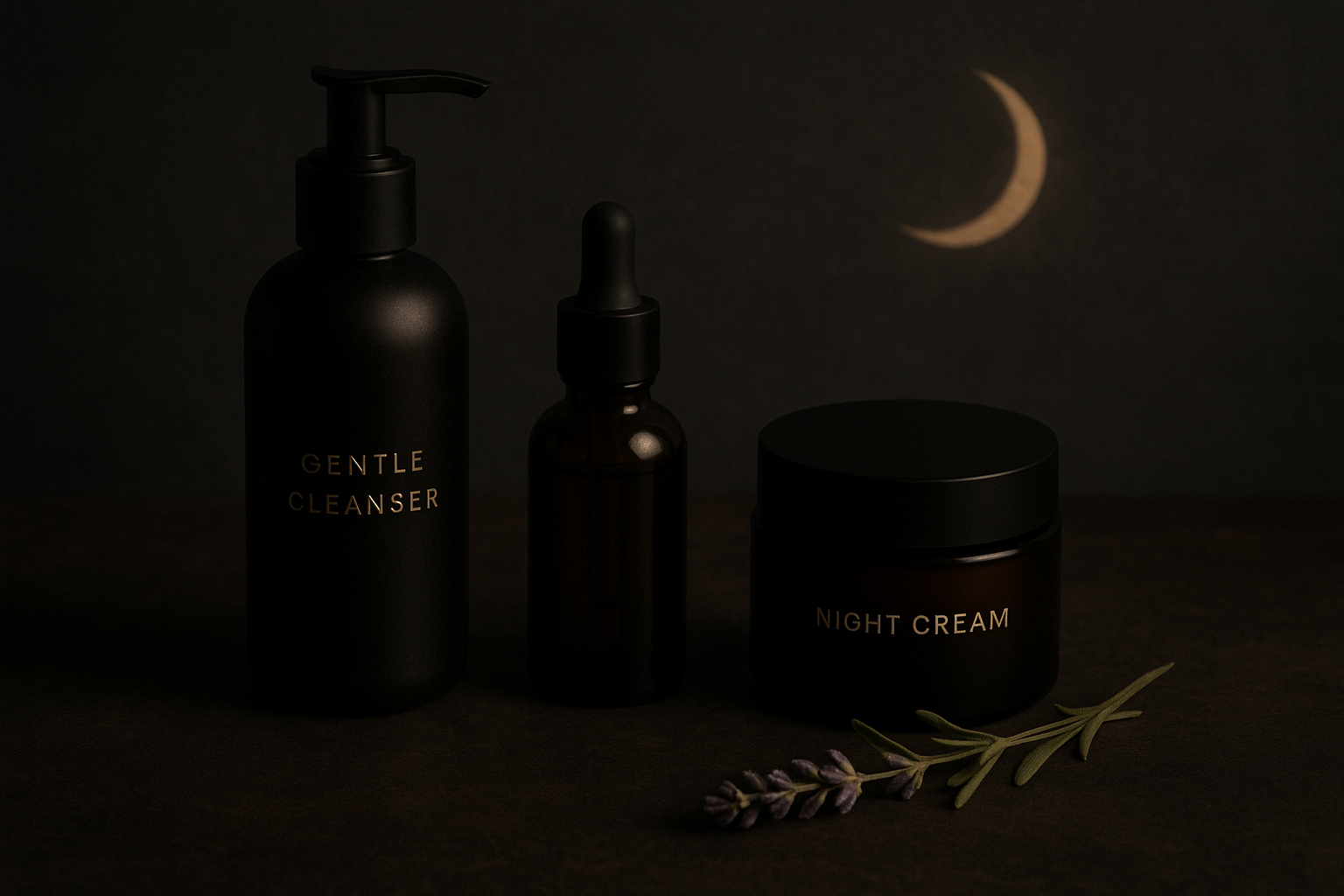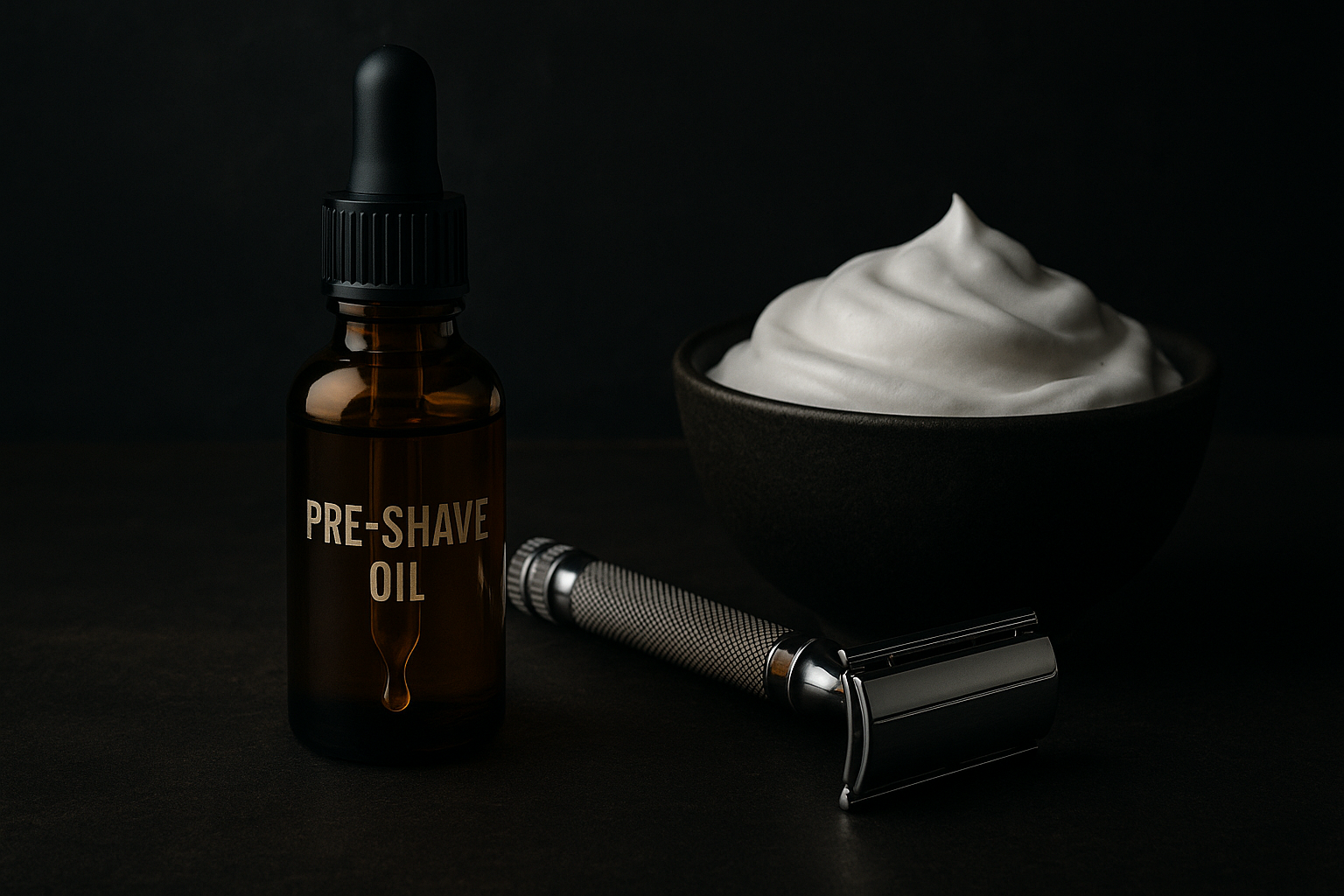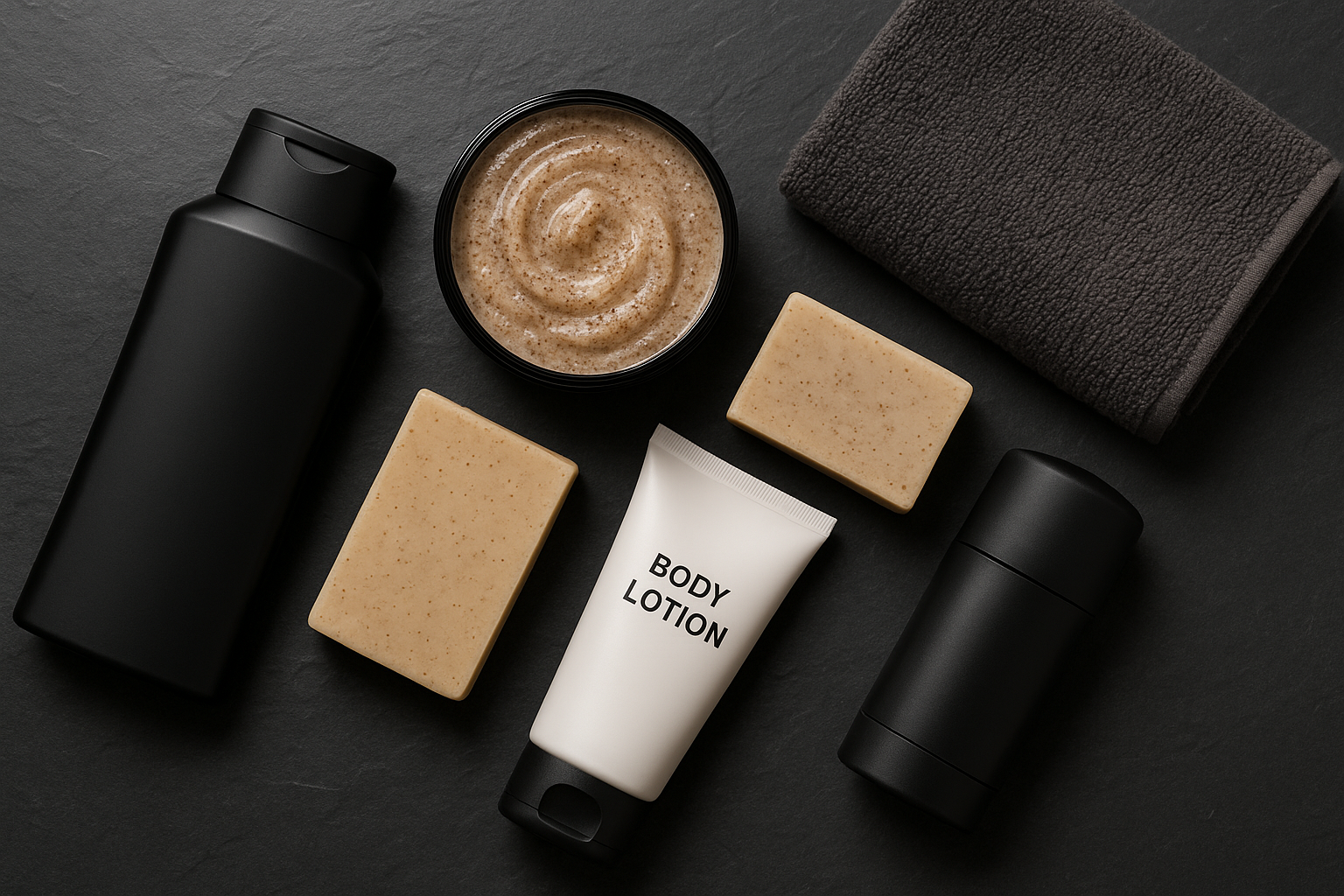You wouldn’t consciously consume food laden with unpronounceable chemicals without a second thought, would you? So why should the products you apply to your skin and beard be any different? Your skin is your body's largest organ, absorbing a significant portion of what you put on it. It's time to extend that ingredient scrutiny to your grooming arsenal.
This comprehensive guide is your key to unlocking the often-confusing world of men’s grooming ingredient labels. We'll empower you to identify common harmful chemicals—like sulfates, parabens, and phthalates—that could be lurking in your daily routine. More importantly, you'll learn how to choose genuinely clean, chemical-free products that nourish your skin and hair, adapting to your needs throughout every season. Get ready to become a conscious consumer and elevate your grooming game with safe, effective solutions.

1. Why Reading Grooming Labels Matters More Than You Think
In an age where "natural" and "organic" are often slapped onto labels without stringent oversight, understanding how to engage in reading grooming labels is paramount. It's not just about avoiding a bad product; it’s about safeguarding your health and advocating for a cleaner industry. Opting for chemical-free grooming is a proactive step towards better well-being.
Health Risks: The Hidden Dangers
The daily application of products containing harsh chemicals can lead to a host of issues. Some common concerns include:
- Broken Skin Barrier: Aggressive chemicals can strip your skin of its natural oils and disrupt its protective barrier. This can lead to dryness, sensitivity, and increased vulnerability to environmental aggressors. A compromised barrier can exacerbate conditions like eczema or rosacea.
- Hormone Disruption: Certain chemicals, known as endocrine disruptors (like some parabens and phthalates), can interfere with your body's hormonal system. Over time, this could contribute to various health concerns.
- Allergic Reactions & Irritation: Synthetic fragrances, harsh preservatives, and certain sulfates are common culprits behind contact dermatitis, redness, itching, and other allergic reactions. According to the American Contact Dermatitis Society, fragrances are one of the most frequent causes of allergic contact dermatitis. While specific statistics for men's grooming products causing dermatitis are often grouped into broader cosmetic categories, the rise in men's grooming product usage suggests a parallel rise in potential irritations if ingredient quality is not prioritized.
Many men have reported a significant reduction in skin irritation, razor burn, and beard itch after consciously switching to grooming products formulated with gentle, natural ingredients. For instance, transitioning from a sulfate-laden beard wash to a gentler, natural alternative like Seven Potions Beard Shampoo can make a noticeable difference in beard health and comfort.
Industry Gaps: Loopholes and Proprietary Secrets
The grooming industry, particularly in some regions, has gaps in regulation that manufacturers can exploit:
- The “Fragrance” Loophole: The term "fragrance" or "parfum" on a label can be a Trojan horse. Due to trade secret protections, companies are not required to disclose the individual chemical components that make up a scent. This means "fragrance" can hide a cocktail of hundreds of potentially irritating or harmful synthetic chemicals, including phthalates.
- Proprietary Blends: Similar to fragrances, companies might list "proprietary blends" without detailing every single component, making it difficult for consumers to know exactly what they're applying.
Consumer Power: Driving Change with Your Wallet
Your purchasing decisions send a powerful message. As more consumers demand transparency and safer formulations, brands are compelled to listen. By choosing products from companies committed to clean ingredients and full disclosure, like Seven Potions, you contribute to a market shift towards healthier, more responsible grooming. Informed shoppers are the driving force behind the growing availability of high-quality, chemical-free grooming options. You can learn more about the importance of choosing the right products in our article, Your Guide to Natural Men’s Grooming Products.
2. Common Harmful Chemicals to Avoid in Your Grooming Products
Navigating ingredient lists can feel like deciphering an ancient script. However, familiarizing yourself with a few common offenders is a crucial step in spotting harmful chemicals and selecting safe skincare ingredients. Here are some of the top culprits to watch out for:

-
Sulfates (SLS – Sodium Lauryl Sulfate, SLES – Sodium Laureth Sulfate):
- What they are: Potent detergents and foaming agents used in shampoos, body washes, and cleansers to create a rich lather.
- Why avoid them: They are extremely effective at stripping oil, so much so that they can remove your skin and hair's natural protective oils. This can lead to dryness, irritation, and a compromised skin barrier. For hair, it can mean brittle, dry strands and an irritated scalp. Research published in journals like the International Journal of Toxicology has assessed their irritation potential.
- Regulatory Status: Generally permitted in the US and EU in rinse-off products, though concentrations are often limited due to irritation potential.
- Safer Alternatives: Look for gentle, plant-derived surfactants like Decyl Glucoside or Coco-Glucoside, often found in high-quality products like Seven Potions Hair Shampoo and Face Wash.
-
Parabens (Methylparaben, Propylparaben, Butylparaben, Ethylparaben):
- What they are: Preservatives used to prevent the growth of bacteria and mold in cosmetics.
- Why avoid them: Parabens can mimic estrogen and have been linked to endocrine disruption. Studies, such as those reviewed by the Breast Cancer Prevention Partners, raise concerns about their potential long-term health effects.
- Regulatory Status: Some parabens (e.g., isopropylparaben, isobutylparaben, phenylparaben, benzylparaben, and pentylparaben) are banned in cosmetics in the EU. Others are restricted. The US FDA continues to review their safety but has not banned them from cosmetics.
- Safer Alternatives: Natural preservatives like vitamin E (tocopherol), rosemary extract, or gentler synthetic options like phenoxyethanol (when used in low, safe concentrations and ideally not the primary preservative).
-
Phthalates (DBP – Dibutyl Phthalate, DEP – Diethyl Phthalate, DEHP – Di(2-ethylhexyl) Phthalate):
- What they are: Plasticizing chemicals used to make plastics more flexible. In cosmetics, they are often used to help fragrances last longer or to make products more pliable.
- Why avoid them: Phthalates are also known endocrine disruptors and have been linked to reproductive issues and developmental problems in some studies. They often hide under the umbrella term "fragrance" or "parfum."
- Regulatory Status: Several phthalates (like DBP and DEHP) are banned in cosmetics in the EU. The US has banned some phthalates in children's toys but not broadly in cosmetics, though the FDA monitors research.
- Safer Alternatives: Choose fragrance-free products or those scented only with natural essential oils. Ensure your beard oils, like Seven Potions Beard Oil, derive their scent from pure essential oils, not synthetic compounds.
-
Synthetic Fragrances/Parfum:
- What they are: A complex mixture of potentially hundreds of undisclosed chemicals used to create a scent.
- Why avoid them: Can trigger allergies, skin sensitivities, respiratory issues, and may contain phthalates or other hormone disruptors. The lack of transparency is a major concern.
- Regulatory Status: The "fragrance loophole" allows non-disclosure of individual ingredients in both the US and EU, although the EU requires labeling of 26 common fragrance allergens.
- Safer Alternatives: Unscented products or products scented with pure, named essential oils. If you enjoy a scented product, ensure it's from a brand that is transparent about its fragrance components.
-
Silicones (Dimethicone, Cyclopentasiloxane, Phenyl Trimethicone):
- What they are: Synthetic compounds used to give products a silky, smooth feel, provide slip, and create a barrier on the skin or hair.
- Why avoid them: While not directly harmful to health for most, silicones can coat the skin and hair, potentially trapping dirt and sebum, leading to clogged pores or build-up that weighs hair down. They are also not biodegradable, raising environmental concerns. For some, they can cause a "suffocating" feeling on the skin.
- Regulatory Status: Widely permitted in both the US and EU, though some specific silicones (like D4 and D5) are under scrutiny in the EU for environmental persistence.
- Safer Alternatives: Natural plant oils and butters (like jojoba oil, argan oil, shea butter) can provide similar conditioning and smoothing effects without the potential for build-up or environmental concerns. Many styling products, like Seven Potions Hair Styling Paste, utilize natural waxes and oils for performance.
By avoiding these chemicals, you're not just being cautious; you're investing in the long-term health of your skin and hair.
3. Decoding the Label: A Step-by-Step Guide to Ingredient Lists
Once you know which ingredients to avoid, the next step is learning how to efficiently scan and understand product labels. This skill is central to effective reading grooming labels and ensuring your choices align with your health goals.
INCI Basics: The Universal Language of Ingredients
INCI stands for International Nomenclature of Cosmetic Ingredients. It's a standardized system of naming ingredients used in cosmetics and personal care products globally. This means that 'Aqua' will always be water, and 'Butyrospermum Parkii Butter' will always be Shea Butter, regardless of the brand or country of origin. Familiarizing yourself with common INCI names for both beneficial and harmful ingredients is key.
Order Matters: What Comes First, Matters Most
One of the most critical aspects of ingredient list order is that ingredients are listed in descending order of concentration. The first few ingredients typically make up the bulk of the product. If a beneficial ingredient you’re seeking is listed towards the very end, it might be present in a very small, potentially ineffective, quantity. Conversely, if a problematic ingredient is high on the list, it's a major component.
Ingredients present at a concentration of less than 1% can be listed in any order after those present at more than 1%.
Hidden Names: The "Fragrance" and "Parfum" Mask
As mentioned earlier, terms like "fragrance," "parfum," or "aroma" can be umbrella terms for a multitude of unlisted chemicals, often including phthalates. If a product boasts a strong scent but only lists "fragrance," approach with caution. Brands committed to transparency will either use no synthetic fragrance or list out the natural essential oils used (e.g., Lavandula Angustifolia (Lavender) Oil).
Look for Reputable Seals and Certifications
Third-party certifications can offer an extra layer of assurance, though they are not a replacement for reading the full ingredient list. Some common seals to look for include:
- Leaping Bunny: Certifies that no new animal testing was used in any phase of product development by the company, its laboratories, or ingredient suppliers.
- COSMOS (Cosmetic Organic Standard): An international standard for organic and natural cosmetics. It has strict requirements for ingredient sourcing, formulation, and environmental impact.
- EWG VERIFIED™: Indicates that products meet the Environmental Working Group's strictest standards for health and transparency, avoiding EWG's ingredients of concern and providing full ingredient disclosure. You can often check specific products and their ingredients on EWG's Skin Deep® database.
Visual Aid: Example Label Analysis
Imagine looking at a hypothetical men's beard wash label:
Ingredients: Aqua (Water), Sodium Lauryl Sulfate, Cocamidopropyl Betaine, Glycerin, Sodium Chloride, Parfum (Fragrance), Methylparaben, Argania Spinosa (Argan) Kernel Oil, Phenoxyethanol, CI 42090.
Call-outs:
- Sodium Lauryl Sulfate (SLS): High on the list (second ingredient), indicating a potentially harsh cleanser.
- Parfum (Fragrance): Undisclosed scent chemicals, possible source of phthalates and allergens.
- Methylparaben: A paraben preservative linked to potential endocrine disruption.
- Argania Spinosa (Argan) Kernel Oil: A beneficial ingredient, but listed after several synthetic chemicals and preservatives, suggesting a lower concentration.
Compare this to a product like Seven Potions Beard Shampoo, where you'll find gentle cleansers and clearly listed natural extracts and oils higher up the list, with no SLS, parabens, or vague "parfum."
4. Building Your Chemical-Free Men's Grooming Routine
Transitioning to a chemical-free grooming routine doesn't have to be complicated. In fact, simplification is often key. By focusing on quality over quantity and understanding the role of safe skincare ingredients, you can build an effective regimen that supports your skin and hair health.
Simplify: Fewer Ingredients Often Mean Fewer Problems
Many mainstream grooming products are packed with fillers, synthetic texturizers, and unnecessary chemicals. A minimalist approach, centered around multi-functional products with transparent, high-quality ingredient lists, can reduce your exposure to potential irritants and sensitizers. When you use fewer ingredients, it's also easier to pinpoint any specific ingredient that might not agree with your skin.
Core Products with Clean Alternatives:
Focus on these essential grooming staples and know what to look for:
-
Cleanser (Face & Beard):
- Avoid: Sulfates (SLS, SLES), harsh synthetic fragrances, parabens.
- Look for: Gentle, plant-derived surfactants like Decyl Glucoside, Coco-Glucoside, or Sodium Cocoyl Isethionate. Natural extracts for soothing or anti-inflammatory properties (e.g., aloe vera, chamomile).
- Seven Potions Picks: Our Pure Equilibrium Face Wash uses gentle cleansers, and our Woodland Harmony Beard Shampoo is renowned for its sulfate-free, natural formulation.
-
Moisturizer (Face & Post-Shave):
- Avoid: Synthetic fragrances, parabens, silicones (if you prefer to avoid them for pore-clogging reasons), mineral oil.
- Look for: Plant-derived humectants like glycerin and hyaluronic acid, natural oils (jojoba, squalane, almond), butters (shea, cocoa), and soothing ingredients like allantoin or bisabolol.
- Seven Potions Picks: The Anti-Ageing Moisturiser is packed with beneficial botanicals and is fragrance-free, while our Post-Shave Balm calms and hydrates without harsh chemicals.
-
Beard Care (Oil & Balm):
- Avoid: Mineral oil, synthetic fragrances, silicones (can prevent absorption of beneficial ingredients), parabens.
- Look for: High-quality carrier oils like jojoba, argan, sweet almond, apricot kernel oil. Natural essential oils for scent and added benefits (e.g., tea tree for its cleansing properties, cedarwood for its grounding aroma). For balms, natural waxes like beeswax or candelilla wax, and butters like shea or mango butter.
- Seven Potions Picks: Our Beard Oils and Beard Balms are crafted with premium natural oils and essential oils, completely free from synthetics. Learn about the power of these ingredients in our post on the benefits of Jojoba and Argan Oil.
-
Hair Styling:
- Avoid: Phthalates (often in fragrance), parabens, heavy silicones, PVP/VA Copolymers (can be drying).
- Look for: Natural waxes (beeswax, carnauba wax), clays (kaolin, bentonite), plant oils, and water-based formulas.
- Seven Potions Picks: Explore our range of styling solutions like the Hair Pomade or Hair Clay, which utilize natural ingredients for hold and texture.
Table of Recommended INCI-Friendly Alternatives:
| Commonly Avoided Chemical Type | Safer INCI Alternatives |
|---|---|
| Harsh Sulfates (SLS, SLES) | Decyl Glucoside, Coco-Glucoside, Lauryl Glucoside, Sodium Cocoyl Isethionate, Disodium Cocoyl Glutamate |
| Parabens | Phenoxyethanol (in low, safe concentrations), Ethylhexylglycerin, Caprylyl Glycol, Sodium Benzoate, Potassium Sorbate, Tocopherol (Vitamin E), Rosmarinus Officinalis (Rosemary) Leaf Extract |
| Phthalates / Synthetic Fragrance | Unscented products, or products scented with pure essential oils (e.g., Lavandula Angustifolia Oil, Citrus Limon Peel Oil, Melaleuca Alternifolia Leaf Oil) |
| Silicones | Natural plant oils (Simmondsia Chinensis (Jojoba) Seed Oil, Argania Spinosa (Argan) Kernel Oil, Prunus Amygdalus Dulcis (Sweet Almond) Oil), natural butters (Butyrospermum Parkii (Shea) Butter), Coco-Caprylate/Caprate, Squalane (plant-derived) |
| Mineral Oil / Petroleum Jelly | Vegetable oils, plant-derived butters, natural waxes (Cera Alba (Beeswax), Copernicia Cerifera (Carnauba) Wax) |
Patch Testing: Your First Line of Defense
Even with natural products, sensitivities can occur. Before incorporating any new product into your routine, always perform a patch test:
- Apply a small amount of the product to a discreet area of skin, like the inside of your wrist or elbow.
- Wait 24-48 hours, monitoring for any signs of redness, itching, burning, or irritation.
- If no reaction occurs, the product is likely safe for you to use. If irritation develops, discontinue use.
This simple step can save you from widespread discomfort and help you identify specific ingredients your skin may not tolerate.
5. Seasonal Grooming Trends & Ingredient Insights for the Discerning Man
Your skin and hair needs can change with the seasons. Understanding these shifts and being aware of emerging grooming trends and beneficial seasonal skincare for men allows you to adapt your routine for optimal health and appearance year-round. This often means looking for specific ingredients tailored to the environmental challenges of each season.
Adapting Your Clean Routine by Season:
-
Winter: Combatting Dryness and Harsh Elements
- Focus: Intense hydration and protection. Cold air and indoor heating strip moisture from skin and hair.
- Key Ingredients: Richer emollients like Butyrospermum Parkii (Shea Butter), Theobroma Cacao (Cocoa) Seed Butter, ceramides (to fortify the skin barrier), and nourishing oils such as Argania Spinosa (Argan) Oil and Persea Gratissima (Avocado) Oil. Humectants like Glycerin and Sodium Hyaluronate (Hyaluronic Acid) are also crucial.
- Product Types: Thicker moisturizers, richer beard balms like Seven Potions Beard Balm, hydrating cleansers that don't strip oils, and perhaps a leave-in beard conditioner. Discover more about winter beard care strategies on our blog.
-
Spring: Renewal and Sun Protection Prep
- Focus: Lighter hydration, repair from winter, and starting to think about sun protection.
- Key Ingredients: Lightweight hydrators like Aloe Barbadensis Leaf Juice, Camellia Sinensis (Green Tea) Leaf Extract (for antioxidant properties), and lighter oils such as Simmondsia Chinensis (Jojoba) Seed Oil. Consider products with added SPF or make sure to use a dedicated sunscreen.
- Product Types: Gel-based or lotion moisturizers, lighter beard oils, and gentle exfoliants to slough off winter dullness. Ensure your daily moisturizer, like our Anti-Ageing Moisturiser, is lightweight yet effective.
-
Summer: Oil Control, Sun Protection, and Hydration
- Focus: Managing sweat and excess oil, robust sun protection, and preventing dehydration.
- Key Ingredients: Non-comedogenic ingredients are key. Look for oil-controlling agents like Kaolin or Bentonite clay in cleansers or masks. Antioxidants like Vitamin C (Ascorbic Acid or its derivatives) can help fight free radical damage from sun exposure. Continue with humectants for hydration.
- Product Types: Foaming or gel cleansers, oil-free or very light moisturizers, broad-spectrum non-comedogenic sunscreens (essential!), and refreshing face mists. A lighter application of Beard Oil can still be beneficial for conditioning without heaviness.
-
Fall: Repair, Reset, and Preparation for Colder Weather
- Focus: Repairing any summer sun damage, evening out skin tone, and gradually reintroducing richer hydration.
- Key Ingredients: Gentle exfoliants like Lactic Acid (an AHA) or Polyhydroxy Acids (PHAs) to address uneven texture or tone. Fruit enzymes (e.g., Papain from papaya, Bromelain from pineapple) offer mild exfoliation. Ingredients that support barrier repair, like Niacinamide.
- Product Types: Start transitioning back to slightly richer moisturizers and beard products. Exfoliating cleansers or serums (used sparingly) can be beneficial. This is a good time to assess if your Beard Grooming Set has all the tools you need for the changing season.
Emerging Ingredient Trends in Clean Men's Grooming:
The world of clean grooming is constantly evolving. Keep an eye out for these innovative trends:
- Biofermented Actives: Ingredients like Bakuchiol (a natural alternative to retinol, known for its anti-aging properties without the irritation potential) and fermented rice water are gaining traction for their efficacy and gentleness.
- Waterless Formulations: Solid bars (shampoo, conditioner, moisturizers) and concentrated products are not only eco-friendly (less water, less packaging) but often mean a higher concentration of active ingredients.
- Upcycled Ingredients: Using byproducts from other industries (e.g., coffee grounds as exfoliants, grape seeds for their antioxidant-rich oil) is a sustainable approach that minimizes waste and harnesses unique natural compounds.
- Microbiome-Friendly Skincare: Products designed to support and balance the skin's natural microbiome (the community of beneficial bacteria living on your skin) are becoming more prevalent, focusing on prebiotics, probiotics, and postbiotics.
Staying informed about these trends can help you make even more sophisticated choices for your clean grooming routine.
6. Brand Spotlight: Seven Potions’ Unwavering Commitment to Clean Grooming
At Seven Potions, our philosophy is simple: men deserve grooming products that are not only effective but also genuinely safe and transparently formulated. Our clean grooming brand ethos is built on a foundation of respect for your health and the environment. Understanding the Seven Potions ingredient philosophy means recognizing our dedication to purity, quality, and performance without compromise.
Our Ingredient Policy: The Seven Potions Standard
We stand firmly by our commitment to your well-being. That's why our entire product line is:
- 100% Paraben-Free: We avoid all types of parabens, ensuring our preservation systems are gentle yet effective.
- 100% Sulfate-Free (SLS/SLES): Our cleansers, like the Woodland Harmony Beard Shampoo and Invigorating Hair Shampoo, use mild, plant-derived surfactants that cleanse effectively without stripping natural oils.
- 100% Phthalate-Free: Any scents in our products come from pure, natural essential oils, never from synthetic fragrances that could hide phthalates.
- Free from Silicones (in most leave-on products): We prioritize natural oils and butters for conditioning and styling, such as in our Hair Styling Paste and Beard Wax, allowing skin and hair to breathe.
- No Artificial Colours or Harsh Chemicals: What you see is what you get – natural formulations that are kind to your skin and hair.
Sourcing with Integrity: The Origin of Our Quality
The efficacy of a natural product begins with the quality of its raw materials. We meticulously source our ingredients, prioritizing:
- Certified Organic Oils: Key ingredients in many of our formulations, such as the Argan Oil and Jojoba Oil found in our celebrated Beard Oil, are often certified organic, ensuring they are cultivated without synthetic pesticides or fertilizers.
- Pure Essential Oils: Our signature scents are crafted from high-grade essential oils, chosen not only for their aroma but also for their therapeutic benefits.
- Cruelty-Free: We are staunchly against animal testing. All Seven Potions products and their ingredients are cruelty-free.
Transparency You Can Trust
We believe you have the right to know exactly what you're putting on your body. That's why we provide:
- Full INCI Listings: Every ingredient is clearly listed on our packaging and product pages, using the standard International Nomenclature of Cosmetic Ingredients.
- Educational Content: Our Seven Potions Society Blog regularly features articles that delve into ingredient benefits, grooming best practices, and the science behind our formulations – like explaining why Vitamin E is a staple in quality beard care.
While we don't currently use batch-level traceability QR codes, our internal quality control ensures meticulous tracking and consistency for every product we craft.
Sustainability: Grooming with a Conscience
Our commitment extends beyond just clean ingredients to encompass environmental responsibility:
- Recyclable Packaging: We predominantly use glass and recyclable PET plastic for our containers, minimizing our environmental footprint. For instance, our Salt Texturizing Spray comes in a thoughtfully designed package.
- Mindful Operations: We continually seek ways to make our operations more sustainable, from sourcing to shipping. While we strive to offset carbon emissions, specific programs vary and we are always working to improve this aspect.
Customer testimonials frequently highlight not only the performance of Seven Potions products but also the noticeable reduction in skin irritation, beard itch, and overall improvement in skin and hair health after making the switch. This feedback fuels our passion and reinforces our clean grooming promise.
Conclusion: Your Journey to Cleaner Grooming Starts Now
You are now armed with the knowledge to confidently navigate men's grooming aisles and online stores. By understanding how to read ingredient labels, spot potential red-flag chemicals, and identify genuinely beneficial components, you can curate a grooming kit that truly serves your skin, hair, and overall health, adapting through every season. Making informed choices is not just a trend; it's a commitment to your well-being and a vote for a more transparent and responsible grooming industry.
Take Control of Your Grooming Routine:
- Empower Yourself Further: Create your own "must-avoid" and "look-for" ingredient list based on this article to take with you when shopping.
- Explore the Seven Potions Difference: Discover our complete range of safe, effective, and sustainably-minded men’s grooming essentials. From revitalizing beard care to natural hair styling and gentle shaving solutions, experience the power of premium, chemical-free ingredients.
- Join the Conversation: Have you had an "aha!" moment reading labels? Did switching to cleaner products make a difference for you? Share your label-reading wins and clean grooming journey on social media using the hashtag #LabelDecoded and tag us @SevenPotions. Let's inspire others to make the switch!



